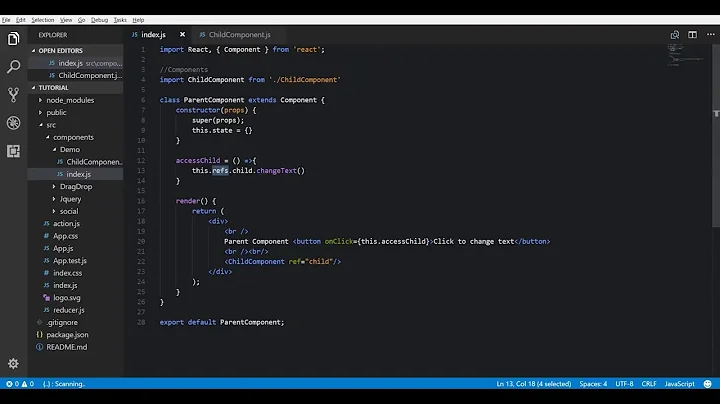How do I access refs of a child component in the parent component
Solution 1
Recommended for React versions prior to 16.3
If it cannot be avoided the suggested pattern extracted from the React docs would be:
import React, { Component } from 'react';
const Child = ({ setRef }) => <input type="text" ref={setRef} />;
class Parent extends Component {
constructor(props) {
super(props);
this.setRef = this.setRef.bind(this);
}
componentDidMount() {
// Calling a function on the Child DOM element
this.childRef.focus();
}
setRef(input) {
this.childRef = input;
}
render() {
return <Child setRef={this.setRef} />
}
}
The Parent forwards a function as prop bound to Parent's this. When React calls the Child's ref prop setRef it will assign the Child's ref to the Parent's childRef property.
Recommended for React >= 16.3
Ref forwarding is an opt-in feature that lets some components take a ref they receive, and pass it further down (in other words, “forward” it) to a child.
We create Components that forward their ref with React.forwardRef.
The returned Component ref prop must be of the same type as the return type of React.createRef. Whenever React mounts the DOM node then property current of the ref created with React.createRef will point to the underlying DOM node.
import React from "react";
const LibraryButton = React.forwardRef((props, ref) => (
<button ref={ref} {...props}>
FancyButton
</button>
));
class AutoFocus extends React.Component {
constructor(props) {
super(props);
this.childRef = React.createRef();
this.onClick = this.onClick.bind(this);
}
componentDidMount() {
this.childRef.current.focus();
}
onClick() {
console.log("fancy!");
}
render() {
return <LibraryButton onClick={this.onClick} ref={this.childRef} />;
}
}
Forwarding refs HOC example
Created Components are forwarding their ref to a child node.
function logProps(Component) {
class LogProps extends React.Component {
componentDidUpdate(prevProps) {
console.log('old props:', prevProps);
console.log('new props:', this.props);
}
render() {
const {forwardedRef, ...rest} = this.props;
// Assign the custom prop "forwardedRef" as a ref
return <Component ref={forwardedRef} {...rest} />;
}
}
// Note the second param "ref" provided by React.forwardRef.
// We can pass it along to LogProps as a regular prop, e.g. "forwardedRef"
// And it can then be attached to the Component.
return React.forwardRef((props, ref) => {
return <LogProps {...props} forwardedRef={ref} />;
});
}
See Forwarding Refs in React docs.
Solution 2
- Inside the child component add a ref to the node you need
- Inside the parent component add a ref to the child component.
/*
* Child component
*/
class Child extends React.Component {
render() {
return (
<div id="child">
<h1 ref={(node) => { this.heading = node; }}>
Child
</h1>
</div>
);
}
}
/*
* Parent component
*/
class Parent extends React.Component {
componentDidMount() {
// Access child component refs via parent component instance like this
console.log(this.child.heading.getDOMNode());
}
render() {
return (
<div>
<Child
ref={(node) => { this.child = node; }}
/>
</div>
);
}
}
Demo: https://codepen.io/itsfadnis/pen/aLWVVx?editors=0011
Solution 3
Here is an example that will focus on an input using refs (tested in React 16.8.6):
The Child component:
class Child extends React.Component {
constructor(props) {
super(props);
this.myRef = React.createRef();
}
render() {
return (<input type="text" ref={this.myRef} />);
}
}
The Parent component with the Child component inside:
class Parent extends React.Component {
constructor(props) {
super(props);
this.childRef = React.createRef();
}
componentDidMount() {
this.childRef.current.myRef.current.focus();
}
render() {
return <Child ref={this.childRef} />;
}
}
ReactDOM.render(
<Parent />,
document.getElementById('container')
);
The Parent component with this.props.children:
class Parent extends React.Component {
constructor(props) {
super(props);
this.childRef = React.createRef();
}
componentDidMount() {
this.childRef.current.myRef.current.focus();
}
render() {
const ChildComponentWithRef = React.forwardRef((props, ref) =>
React.cloneElement(this.props.children, {
...props,
ref
})
);
return <ChildComponentWithRef ref={this.childRef} />
}
}
ReactDOM.render(
<Parent>
<Child />
</Parent>,
document.getElementById('container')
);
Solution 4
First access the children with: this.props.children, each child will then have its ref as a property on it.
Solution 5
Using Ref forwarding you can pass the ref from parent to further down to a child.
const FancyButton = React.forwardRef((props, ref) => (
<button ref={ref} className="FancyButton">
{props.children}
</button>
));
// You can now get a ref directly to the DOM button:
const ref = React.createRef();
<FancyButton ref={ref}>Click me!</FancyButton>;
- Create a React ref by calling React.createRef and assign it to a ref variable.
- Pass your ref down to by specifying it as a JSX attribute.
- React passes the ref to the (props, ref) => ... function inside forwardRef as a second argument.
- Forward this ref argument down to by specifying it as a JSX attribute.
- When the ref is attached, ref.current will point to the DOM node.
Note The second ref argument only exists when you define a component with React.forwardRef call. Regular functional or class components don’t receive the ref argument, and ref is not available in props either.
Ref forwarding is not limited to DOM components. You can forward refs to class component instances, too.
Reference: React Documentation.
Related videos on Youtube
user1354934
Updated on July 05, 2022Comments
-
user1354934 almost 2 years
If I have something like
<Parent> <Child1 /> <Child2 /> <Child3 /> </Parent>And I want to access from
Child2where I haverefs="child2refs", how can I do that? -
 Ian J Miller about 6 yearsnot sure if it's dependent on version num, but in React < 16.3 I was able to do this without using
Ian J Miller about 6 yearsnot sure if it's dependent on version num, but in React < 16.3 I was able to do this without usinggetDOMNode()and just usethis.child.heading -
 Nikhil Fadnis about 6 years@IanJMiller the ref is accessed as
Nikhil Fadnis about 6 years@IanJMiller the ref is accessed asthis.child.heading, in the example I'm just printing the dom node associated with it -
png almost 5 yearsNice. This implementation is much more straight forward than React.forwardRef()
-
 pmiranda over 4 yearsAnd for a child of a child? let's say, a component that is rendered inside of
pmiranda over 4 yearsAnd for a child of a child? let's say, a component that is rendered inside of<Child>how can I reference it from Parent? -
clapas almost 4 yearsIsn't there a cyclic dependency when you return Child inside Child?
-
Marecky over 3 yearsThe third example was IT!
-
CodeFinity about 3 yearsConsider moving the React bashing to the bottom of the answer instead of leading off with it.
-
Ryan Weiss about 3 yearsThanks. I already did, even considered removing it. Then, I forgot. Now that you mention it, I think I will leave it so that only those who can read through it, understand the concerns, and still make it to the solution, might actually warrant worthy usage out of it. Maybe you have some comments on the integrity of the solution? Cheers.
-
CodeFinity about 3 yearsSolution is fine. It depends on your intentions as it's your answer, but if folks are on here to focus on getting code solutions expeditiously, then the lead in you have deters from that one.
-
Ryan Weiss about 3 years@CodeFinity Point taken and entry edited. Thanks.
-
 doug65536 over 2 yearsTypeless Typescript. What type is your
doug65536 over 2 yearsTypeless Typescript. What type is yourthis.props.children?






